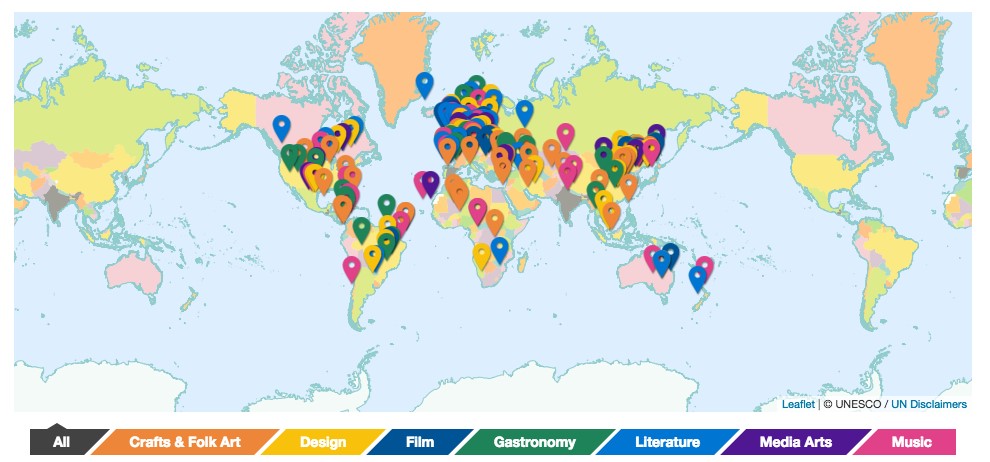We are happy to announce the first winner of the new SAFN Student Research Award. This annual award supports the research phase of an original project focused on food and nutritional anthropology. This award is focused on decolonized, ethical research on food justice and food sovereignty. For 2020, the award goes to Ellen Platts, a PhD Candidate in Anthropology at the University of Maryland. It will support her research on sustainability and food heritage activism in Tucson, AZ. Reviewers were impressed with her innovative and well-defined research problem, her use of theory from both food studies and anthropology, and the relationship between her research and questions of food justice. Read below for more details about her research. Click here for more information about the award. The next deadline for submissions is March 31, 2021.
Pursuing Just Sustainability in the City of Gastronomy: Food, Heritage, and Development
Ellen Platts
University of Maryland
When we say sustainable development, what do we mean? What are we sustaining, or developing? In thinking about sustainable development in combination with concerns around traditional food practices, food justice, and the challenges of climate change in a desert city, this question gains even more urgency. In my dissertation project, I investigate the creation and consequences of urban sustainability initiatives that use food heritage as a springboard for development. Based in Tucson, Arizona, I explore how the city’s 2015 designation as a Creative City of Gastronomy, and its participation in the UNESCO Creative Cities Network, influence how different communities envision and pursue their ideas about sustainability, heritage, and justice. Understanding how to evaluate, articulate, and bring together these visions is essential to pursuing food justice, minimizing risk to communities, and ensuring the long-term sustainability of urban places.
Situated within the United Nations’ Agenda 2030 and its 17 Sustainable Development Goals, the Creative Cities Network is one of UNESCO’s flagship programs for using cultural heritage and creativity for sustainable development. The Network highlights seven fields in which a city can be recognized: crafts and folk art, design, film, gastronomy, literature, music, and media arts. As of October 2020, there are 246 cities in this transnational network, working together across national borders. Thirty-seven of these cities are recognized specifically for gastronomy, and include cities such as Parma, Italy; Belem, Brazil; and San Antonio, Texas, the United States’ other City of Gastronomy. In Tucson, the recognized gastronomy draws together Tohono O’odham, Pascua Yaqui, Northern Mexican, and Mission-era Mediterranean food traditions and the intangible heritage food practices of many communities in and around Tucson. This initiative draws upon the large agricultural economy of the area, a host of independently owned restaurants, festivals such as the annual Tucson Meet Yourself (colloquially known as Tucson Eat Yourself), and a variety of community groups dedicated to food and agriculture.

As a sustainable development program, membership in the Creative Cities Network means that cities use creativity and culture to work towards the UN’s Sustainable Development Goals. The concept of sustainable development has been critiqued as being more of a myth than a practice, or even a potentially paradoxical notion. In my project, I therefore think proactively not only in terms of sustainable development, but in terms of developing just sustainability, as articulated by Julian Agyeman and colleagues. Just sustainability is a framework for pursuing environmental, climate, food, and social justice broadly, and for striving towards just, equitable, and inclusive futures. Agyeman (2020) argues that the Sustainable Development Goals reflect the four conditions of just sustainability through their acknowledgment of the links between the environment and human equality. The framework of just sustainability therefore provides a set of aspirational standards for this exploration of the UCCN initiative in Tucson.

With the support of the Society for the Anthropology of Food and Nutrition’s Student Research Award and a NSF Doctoral Dissertation Research Improvement Grant, I will conduct 18 months of fieldwork in Tucson exploring what food heritage means for different groups, how its use in development is perceived and pursued, and what different visions for a sustainable city exist. Through semi-structured interviews, participant observation, and archival research, I will investigate the broader issues around tensions of power that emerge when knowledges and experiences passed down through generations, and embodied in present communities, are tapped for new uses by new actors. While the COVID-19 pandemic means that ethnographic fieldwork looks a little bit different these days, I look forward to holding online interviews, and conducting socially distant participant observation in community gardens, urban farms, and food banks, where work must continue in the face of all challenges.
I want to thank the Society for the Anthropology of Food and Nutrition for supporting my work through the 2020 Student Research Award. I look forward to safely getting into the field this January!
References:
Agyeman, Julian. 2020. “Local Environment and the UN Sustainable Development Goals.” Local Environment 25 (5): 336–37. https://doi.org/10.1080/13549839.2020.1751444.